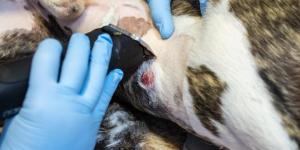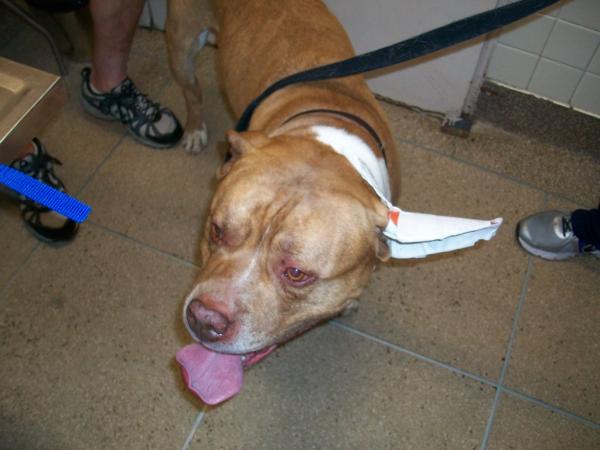My Dog Has a Swollen Ear - Aural Hematoma in Dogs



See files for Dogs
Dogs can often develop small lumps, some temporary, others permanent. Since they are active animals, they may sustain injuries when they are too boisterous. Insect bites and parasites are attracted to their fur which can result in lumps and swelling. These can all affect the ear, but many might resolve themselves naturally or do not cause concern. With aural hematomas, the swelling can be quite acute and worrying for the dog's guardian.
If your dog has a swollen ear, it is very important you go to a veterinarian to diagnose the problem. One of the most common is an aural hematoma which can cause serious discomfort and even result in deformation of the ear. We look at the causes and treatment of aural hematomas so you can best know what to expect.
Reasons for a dog's swollen ear
There are various reasons why a dog might have a swollen ear. Sometimes it can appear as if the general area of the ear pinna is swollen. Other instances may see one or more lumps of varying sizes. Differentiating between them will help us to determine the problem, but it is essential you go to a veterinarian for an accurate diagnosis. Causes of swelling in a dog's ear include:
- Parasites: if a parasite has bitten the ear, it is possible an allergic reaction can lead to swelling. They may also lay eggs in the skin which can cause swelling, although this is relatively uncommon.
- Trauma: if a dog has been in an accident such as being hit by a car or running into a sharp edge, they may incur an injury which leads to swelling. When dogs fight each other, they will often bite each others ears, also leading to physical trauma and inflammation. Some guardians crop ears and dock tails for this reason, although it is a controversial practice.
- Tumor: it is possible a tumor can develop on the ear, especially skin cancer. Dogs with little or no hair are at greater risk, although it is not generally a common ear disease.
- Ear infection: the flap of the dog's ear is known as the pinna, but it is possible the inner ear can also cause problems. If an ear infection caused by bacteria entering the ear canal develops enough, it can cause the outer ear flap to become inflamed also.
- Abscess: a cut, bite or wound can become infected and form an abscess in dogs. This is when the body's immune system caused pus to collect under the skin as a means to fight the infection. Bacteria entering skin pores and hair follicles can also cause abscesses. They usually resolve on their own, but can require draining.
- Aural hematoma: see below.
Another cause of a dog having a swollen ear is an allergic reaction. This can cause swelling on different parts of the body, something we explain further in this article on why a dog has a swollen face.
What is an aural hematoma in dogs?
A hematoma consists of the accumulation of blood in tissue under the skin, not in blood vessels. The word aural means it is ‘of the ear’. Our attention is usually first brought to it due to the dog either excessively shaking their head or scratching their ears. Both signs usually point to an ear condition which is causing an itch. To treat the hematoma, it is necessary for the veterinarian to determine its underlying cause. We detail these below.
The symptoms of an aural hematoma in dogs are self-evident. We will likely first see the dog scratching at their head. We may then see that the ear is inflamed and may even be warm to the touch. This is why the dog will have a swollen ear. We should not delay taking the dog to a veterinarian. If we do, the hematoma can become larger and affect the prognosis. An untreated hematoma can cause deformation of the ear as well as potential deafness.
Ear scratching in dogs is only one way they can damage themselves. Check out our article on why your dog scratches their eyes for more information.

Causes of aural hematoma in dogs
Once we have noticed our dog's ear is swollen, we will need to consider the underlying cause. The direct cause of the hematoma is likely the scratching itself, but it usually begins with one of the following:
- Mites or other parasites
- Foreign bodies
- Irritating substance
- Infections
These causes lead the ear to become irritated and the dog will scratch them. It is this scratching which likely causes the hematoma (although it can be caused by disease). The action of the paw can cause an open wound and the swollen ear may be due to an abscess if it gets infected. With a hematoma, there is no open wound, but there is damage to the tissue.
In addition to treating the hematoma, the veterinarian will have to run diagnostic tests to determine the underlying cause. Only then can the appropriate treatment be administered. For example, if the hematoma is due to the presence of a foreign body, it will have to be removed. Mites or other parasites will have to be killed and bacterial infections will likely require antibiotics. Anti-inflammatories such as ibuprofen for dogs may be administered to help with pain and reduce the inflammation of the dog's swollen ear.
Treatment for aural hematomas in dogs
Although aural hematomas will often reduce on their own, it is important we take the dog to a veterinarian. Not only can they rule out another cause of the swollen ear, but they can reduce the possibility of any complications. They will also prescribe ways to manage the pain when applicable.
The first thing we should know about treating an aural hematoma in dogs is that home remedies will not work. Some sites or sources claim they will, alternatives to veterinary medicine can make the situation worse or prolong suffering.
Aural hematomas which are not treated can allow the blood to reabsorb into the body since it is not drained. Although it can affect the shape of the ear, this is not just an aesthetic problem. It can affect the movements of the ear which is an important part of a dog's communication and body language.
Dog caregivers should not administer canine antibiotics for aural hematomas in dogs. Only the veterinarian can prescribe these as not all cases will involve an infection. Not only will this affect the efficacy of antibiotics in the future, but we can also complicate the medical picture.

Surgery for aural hematoma in dogs
When faced with an aural hematoma, the veterinarian may choose to drain the accumulated blood with a needle and syringe. For this procedure, the vet will insert the needle and draw the blood out with a syringe. In cases where this is not sufficient to remedy the problem, surgery for the hematoma may be required. There are different techniques, but generally the skin will be stretched and blood drained to avoid more accumulation.
An incision is sometimes made to drain the blood with a small piece of skin removed so it can continue to drain. This may result in an open wound left until the hematoma is completely drained. In these cases, we will need to provide an Elizabethan collar to prevent the dog from scratching it. This both gives the wound the time to heal as well as avoids infection.

Prevention of aural hematoma in dogs
To prevent hematomas in a dog's ear, we need to ensure we examine them regularly. This should be de rigueur as part of the dog's grooming routine, i.e. when we brush their coat and check for parasites, etc. Some people think it is helpful to remove hair that resides in the ear of the dog. However, this is counterproductive and can promote the presence of bacteria and parasites in the ear.
We will need to take the dog to the veterinarian as soon as we see any signs of the ear swelling. If we hesitate, we will give the dog more opportunity to scratch the ear and make it worse, especially if it leads to a hematoma. We should also be incorporating regular ear cleaning into their hygiene routine. Watch the video below to see a tutorial on how this is done:

This article is purely informative. AnimalWised does not have the authority to prescribe any veterinary treatment or create a diagnosis. We invite you to take your pet to the veterinarian if they are suffering from any condition or pain.
If you want to read similar articles to My Dog Has a Swollen Ear - Aural Hematoma in Dogs, we recommend you visit our Other health problems category.






 Early onset hematoma can be treated with a FDA concluded Class 1 Medical Device the Auralsplint. Non-surgical to prevent any wounding to treat the hematoma. Can be performed outside of the clinic or in a treatment room without general anesthesia. Auralsplint.org offers this treatment to vets as a first line of defense. Pictured is an Auralsplint treatment installed at AMC-NYC Manhattan New York by founding President Daniel Whitton.
Early onset hematoma can be treated with a FDA concluded Class 1 Medical Device the Auralsplint. Non-surgical to prevent any wounding to treat the hematoma. Can be performed outside of the clinic or in a treatment room without general anesthesia. Auralsplint.org offers this treatment to vets as a first line of defense. Pictured is an Auralsplint treatment installed at AMC-NYC Manhattan New York by founding President Daniel Whitton.




